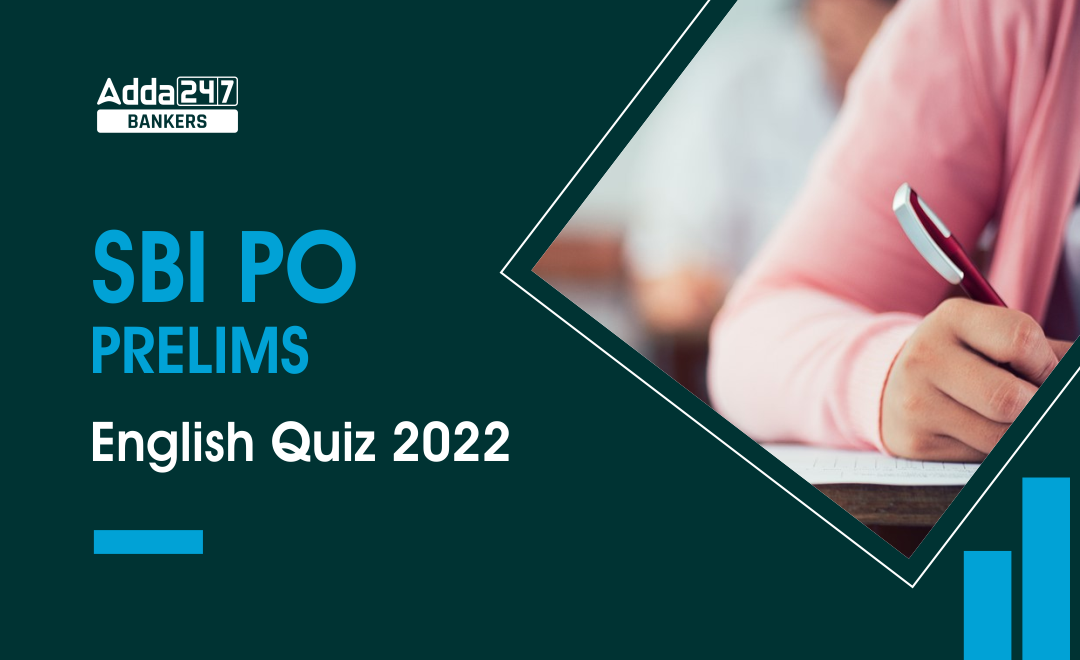Directions (1-5): Read each sentence to find out whether there is any grammatical or idiomatic error in it. The error, if any, will be in one part of the sentence. The number of that part is the answer. If there is ‘No error’, the answer is (e). (Ignore errors of punctuation, if any.)
Q1. Unless you take (a)/ an interest into the studies (b)/ you will not succeed (c)/ in the examination. (d) /No error (e)
Q2. Visiting tribals and (a)/ talk to them are (b)/ the activities which (c)/ all of us enjoy. (d)/ No error (e)
Q3. The proper assessment of (a)/ the training needs allow (b)/ for meaningful follow-up (c)/ of the training activity (d)/No error (e).
Q4. I am working (a)/ in this organisation (b)/ without any break (c)/ for the last thirty years. (d)/ No error (e)
Q5. Air pollution in Delhi is (a)/ not of recent origin and (b)/ successive governments(c)/ have failed in finding solutions.(d)/ No error (e).
Directions (6-10): Rearrange the following sentences (A), (B), (C), (D), (E), and (F) to make a meaningful paragraph and then answer the questions which follow.
A. According to it, organized retail stores are not wolves at the doors of friendly neighbourhood grocery stores as there is room for expansion of both.
B. Many have been crying foul over the entry of organized retail stores expressing concern over their impact on small store owners.
C. The final winner in the competition, however, is the common man who gets to choose between the most suitable options and in turn fights with the runaway inflation in prices of essential commodities.
D. In spite of this potential for expansion, it is doubtless that the small store owners face a decline in profit in initial years if organized retailers set up stores in the vicinity.
E. But a study conducted over a period of two years goes a long way towards allaying these fears.
F. This impact, however, wears off once they learn to take on the competition which, in turn, enhances efficiency all around.
Q6.Which of the following sentence should be the FIRST after rearrangement?
(a) A
(b) B
(c) C
(d) D
(e) E
Q7. Which of the following sentence should be the THIRD after rearrangement?
(a) A
(b) E
(c) D
(d) F
(e) C
Q8. Which of the following sentence should be the SIXTH after rearrangement?
(a) A
(b) B
(c) C
(d) E
(e) F
Q9. Which of the following sentence should be the SECOND after rearrangement?
(a) A
(b) B
(c) C
(d) E
(e) F
Q10. Which of the following sentence should be the FIFTH after rearrangement?
(a) D
(b) B
(c) C
(d) E
(e) F
Directions (11-15): Which of the phrases (a), (b), (c), and (d) given below each sentence should replace the phrase printed in bold type to make sentence grammatically correct? If the sentence is correct as it is, mark (e), i.e., No correction required, as the answer.
Q11. I overheard him saying something to me when I was quit.
(a) was almost quit
(b)was about to quit
(c) had about to quit
(d)had been quitting
(e) No correction required
Q12. We had not only helped them with money but also with new machinery and raw material.
(a) not only helped them by
(b)helped them not only with
(c) helped not only to them with
(d)not only been helped them by
(e) No correction required
Q13. I was shocked to learn that no one was knowing where the files were kept.
(a) had been knowing
(b)had been known
(c) knew
(d)was known
(e) No correction required
Q14. All you really need is a mask, a tube, flippers and a spear gun.
(a) You really need are
(b)Your really need are
(c) You real need is
(d)You really needed is
(e) No correction required
Q15. By contrast, the construction of great temples which had seemingly have presented great engineering difficulties, was relatively easy.
(a) had seemingly been presented
(b)had been seemed present
(c) was seemingly presented
(d)would seemingly have presented
(e) No correction required
Solutions:
S1. Ans. (b)
Sol. ‘in’ will be used in place of ‘into’.
S2. Ans. (b)
Sol. Use ‘talking’ in place of ‘talk’ as ‘visiting’ used in part (a) of the sentence is gerund and if one word is gerund, then other word connected with ‘and’ must also be gerund.
S3. Ans. (b)
Sol. ‘allowing’ will be used in place of ‘allow’ as after ‘allow’, V4 is used in the form of passive infinitive.
S4. Ans. (a)
Sol. ‘I have been working’ will be used in place of ‘I am working’ because as the sentence is in present perfect continuous tense.
Ex. I have been working here for the last two years.
S5. Ans. (e)
Sol. The sentence is grammatically correct.
Sol. Minuscule means extremely small. So, enormous is the word which is opposite in meaning to it.
Directions (6-10): The correct sequence to form meaningful sequence is BEADFC.
S6. Ans.(b)
S7. Ans. (a)
S8. Ans. (c)
S9. Ans. (d)
S10. Ans. (e)
S11. Ans.(b)
Sol. Replace ‘was quit’ with ‘was about to quit’
S12. Ans.(b)
Sol. Replace ‘not only helped them with’ with ‘helped them not only with’
S13. Ans.(c)
Sol. Replace ‘was knowing’ with ‘knew’
S14. Ans.(e)
Sol. No correction required
S15. Ans.(d)
Sol. Replace ‘seemingly have presented’ with ‘would seemingly have presented’





 RBI ऑफिस अटेंडेंट एग्जाम एनालिसिस 2026 (...
RBI ऑफिस अटेंडेंट एग्जाम एनालिसिस 2026 (...
 इंडिया पोस्ट जीडीएस रिजल्ट 2026: कब जारी...
इंडिया पोस्ट जीडीएस रिजल्ट 2026: कब जारी...
 Bihar ANM Recruitment 2026 Update: 8938 ...
Bihar ANM Recruitment 2026 Update: 8938 ...










